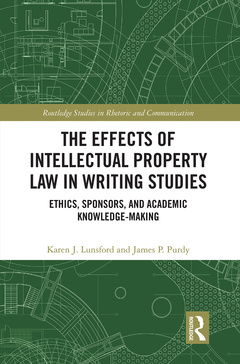Description
The Effects of Intellectual Property Law in Writing Studies
Ethics, Sponsors, and Academic Knowledge-Making
Routledge Studies in Rhetoric and Communication Series
Language: English
Keywords
NIH Public Access Policy; IRB Office; research; IP Issue; teaching; Writing Studies; law; Ethical Lenses; rhetoric; Writing Studies Scholars; faculty; Scholarly Communication Practices; IP; Early Career Training; academia; American Library Association; higher education; California State University; copyright; IP Concern; digital; Cc License; authorship; Institutional Review Boards; ethical stances; OA Fee; IP Experience; academic knowledge-making; CV Line; intellectual property laws; IP Legislation; Sage Handbook; Bayh Dole Act; Academic IP; Open Access Textbooks; Takedown Notices; UC System; Professional Development; IP Practice
Publication date: 08-2022
Support: Print on demand
Publication date: 12-2019
· 15.2x22.9 cm · Hardback
Description
/li>Contents
/li>Readership
/li>Biography
/li>
This book documents the intellectual property experiences of writing studies scholars and challenges naturalized ways of responding to intellectual property concerns.
Analyzing results of a nationwide survey and semi-structured interviews to examine ways decisions about intellectual property (IP) during academic knowledge-making are mediated by histories of enculturation, ethical lenses, and IP sponsors, the book:
- Identifies and illustrates a range of ethical stances that academics might adopt in regard to IP and the range of human, institutional, and technological sponsors that can mediate IP decisions;
- Provides evidence that IP affects all of the processes of academic knowledge-making, not just the final product;
- Offers heuristic questions that academics can and should ask throughout their teaching, research, and editing to make proactive IP decisions.
The book is an essential read for academics working in writing studies and the humanities as well as those interested in IP. This text could also be used in graduate student training in writing studies and related disciplines.
1. Introduction 2. Histories of Intellectual Property in Academia 3. Ethical Lenses Academics Bring to Intellectual Property Decisions 4. Sponsors that Mediate Academic Intellectual Property Decisions 5. Effects of Intellectual Property on the Academic Knowledge-Making Cycle 6. Conclusion
Karen J. Lunsford is Associate Professor of Writing and Director of the PhD Emphasis in Writing Studies at the University of California, Santa Barbara. Most recently, she has co-edited a special issue of the online journal Kairos on Ownership, Authorship, and Copyright.
James P. Purdy is Associate Professor of English/Writing Studies and Director of the University Writing Center at Duquesne University, where he received the Presidential Award for Excellence in Teaching. He has co-edited four books and written numerous articles and book chapters on digital writing and research practices and spaces.




